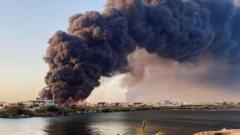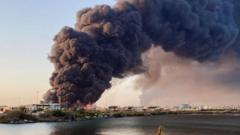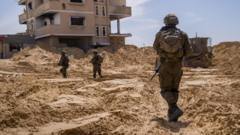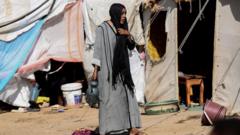Amid ongoing civil conflict, Sudan has cut diplomatic relations with the United Arab Emirates, alleging the Gulf country's backing of the Rapid Support Forces, which have perpetrated recent attacks in Port Sudan.
**Sudan Abruptly Ends Diplomatic Relations with UAE Amid Conflict Allegations**

**Sudan Abruptly Ends Diplomatic Relations with UAE Amid Conflict Allegations**
Sudan's Defence Minister accuses UAE of supporting rival paramilitary forces, prompting severed ties and heightened regional tensions.
Sudan has officially severed diplomatic ties with the United Arab Emirates (UAE), escalating tensions amid the ongoing civil war in the nation. Defence Minister Yassin Ibrahim announced the decision, citing the UAE's alleged support for the Rapid Support Forces (RSF), which have conducted a series of aerial attacks on Port Sudan, historically regarded as a haven from conflict.
The confrontation began on Sunday and has intensified through the week. The Sudanese government holds the RSF responsible for breaches of security in the region, including drone strikes targeting critical infrastructure such as the international airport and power stations. These attacks have drawn condemnation from the Sudanese army, which claims to have successfully intercepted additional threats directed at key military facilities.
Accusations against the UAE came to a head after Sudan’s Defence Minister accused the Gulf state of infringing on Sudanese sovereignty through its alleged proxy forces. While the Sudanese government demands accountability, the UAE has vehemently denied any involvement, insisting it does not support the RSF with financial or military aid.
The fallout from this diplomatic breach includes the withdrawal of the Sudanese ambassador from the UAE and the closure of Sudanese diplomatic missions in the Gulf nation. The Emirati response, through political spokesperson Reem Ketait, has urged the international community to focus on humanitarian assistance for affected civilians rather than individual accusations.
This conflict has far-reaching implications, as millions of Sudanese endure ramifications from violence that has resulted in severe humanitarian crises—classified as the world's worst. Furthermore, the United Nations’ top court recently dismissed Sudan’s legal claims against the UAE related to genocide accusations, complicating international discourse involving accountability and foreign intervention in the ongoing strife.
Both the UAE and Qatar have been highlighted in international calls for disengagement and humanitarian aid support, yet the situation remains precarious as both military factions in Sudan face accusations of war crimes.
As Sudan grapples with the impact of civil war, regional dynamics and international relations are increasingly at play, underscoring the complexity of governance, sovereignty, and humanitarian needs in the face of violence and instability.




















